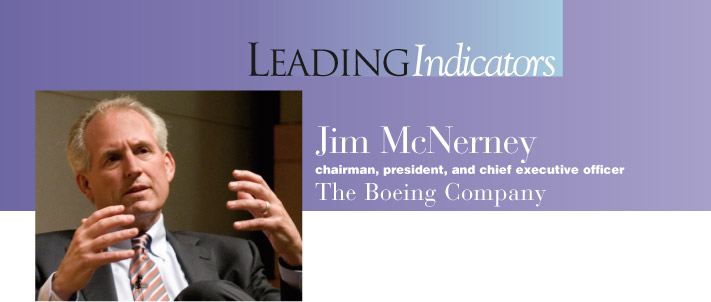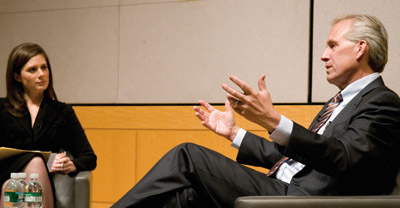
Jim McNerney is chairman, president, and chief executive officer of aerospace giant Boeing, the world’s largest manufacturer of commercial jetliners and military aircraft, with $66.4 billion in 2007 revenues. Prior to joining Boeing in 2005, McNerney was chairman and CEO of 3M, a $20 billion global technology company. Before that, he spent 19 years in a variety of top-level executive positions at GE, including CEO of GE Aircraft Engines.
Jim McNerney was interviewed on November 12 by Erin Burnett, anchor of CNBC’s “Street Signs” and co-anchor of CNBC’s “Squawk on the Street.” She also appears regularly on NBC’s “Today” and “Nightly News with Brian Williams.” |
Erin Burnett: The big question right now is, how bad is it out there?
Jim McNerney: We’re trying to sort through the credit crisis. The consumer is not spending. Corporations are beginning to react by reining in spending and getting costs in line. I’d say that we’re in for a difficult time.
EB: From your perspective, when you look at orders, is there a pause or is it a halt that is still under way?
JM: Our business is a very long-cycle business where we’re delivering things that people ordered four or five years ago, in many cases. The immediate test is whether people can finance the planes we are now delivering, and in most cases they can. But I do anticipate some cancellations and deferrals. We have a capital corporation, Boeing Capital, that is a lender of last resort, so, in some cases, we can step in there. But as I look at the next four to five quarters, we’re in pretty good shape.
“Our business is a very long-cycle business where we’re delivering things that people ordered four or five years ago, in many cases. The immediate test is whether people can finance the planes we are now delivering, and in most cases they can.” |
EB: Has anything changed in terms of how you’re running your business, or how much you’re investing in new development?
JM: Not yet. And I don’t anticipate that it will. The 787, the Dreamliner, is 30 percent more efficient than the planes it will replace. So if an airline can get financing, they will take this airplane. We have 900 orders. It represents sort of a step-function change in productivity for these airlines. The only other major development is a refurbishing of the 747, both a freighter and a passenger version. We’re going to protect our ability to invest there by controlling costs in other places.
EB: When you look at the places in the world that have been driving your business – the Middle East and Asia – do you see weakness yet? Do you think we’re decoupled from the rest of the world or are more intricately linked than we ever thought before?
JM: I certainly see the signs of economic weakness in places like Dubai and China and continued stagnation in Japan, and India is struggling. I’ve just named places that order a heck of a lot of airplanes from us. Has it gotten to the point where they’re not going to take delivery on the eight years worth of backlog that we have with them? Not yet. We’re very fortunate to have a very big backlog with these guys. I think there’s no doubt future orders will slow down.
EB: Are you concerned that our government is getting too involved in allocating capital?
JM: I think President-elect Obama has a more balanced view than people give him credit for. This is a guy with a lot of capacity. I see him more like Bill Clinton in his early days, when everybody was concerned about a liberal agenda and he came in with a pretty balanced view.

CNBC’s Erin Burnett interviewed Jim McNerney at a CEO Series event held at NYU Stern in November. |
EB: As the largest exporter, you have to care about free trade. During the campaign, President-elect Obama had been very specific that he would renegotiate NAFTA, and had been vocal in not supporting bilateral trade agreements. But then he picked Rahm Emanuel, who wrote NAFTA, to be his Chief of Staff. So it could lead to some confusion over whether he’s going to renegotiate. What do you think?
JM: I think it was a very good sign that he picked Rahm for that job. He’s a moderate who was involved with free-trade design. I think history tells you that at times like this, if you take protectionist measures, it can be a real mess because you end up protecting the weakest parts of your economy. And there is inevitably a response from your trading partners who say, “Hey, wait a minute. If we don’t have access to your markets, you don’t have access to ours.” Immodestly, we at Boeing view ourselves as innovators who can compete on a global basis in any country, so we want open competition everywhere. We think that industries should be restructured that can’t compete globally, just like we should be, too.
EB: Do you believe in a public works project right now?
JM: I think there have been examples through history where some amount of public works has been a stimulus to the economy. The infrastructure in this country needs some work. I hope they redo the air traffic control system because that’s my pet project, and it’s a mess right now. These projects can work, as long as they drive employment and there is a real return.
EB: Are unions, as they’re structured in this country, a positive factor or a negative one that actually impedes growth?
JM: You can find examples where unions have played a negative role in a company’s or industry’s competitiveness, such as automobiles, steel, or the railroad industry in times past. There are also examples where unions and companies are producing very efficient, competitive organizations, such as the Teamsters at UPS. I think Washington should stay out of the way and allow the collective bargaining process to work. If people want to form a union, they should be able to form a union. There should be balance without government interference. Now, we [Boeing] have had some difficulties [in 2008]. A balanced view would say that the union overreaches sometimes, and maybe management does some things that they wish they hadn’t done, too. It’s a difficult situation for us, but we worked through it, and I think we’re in a good spot.
EB: If oil prices stay where they are now, does the whole “green” phenomenon make sense without massive government support?
JM: I think the short answer is yes. I think in our industry the economic incentives and the green incentives line up well. I think in the auto industry it’s a more complicated argument. It’s not clear that people will always buy the more efficient car. But you have to argue in the name of the common good that some regulation makes some sense.
EB: When I graduated from school, Wall Street was the place to go. A lot of those jobs aren’t going to come back any time soon. Does that make it better for your industry, in terms of recruitment?
JM: There are signs of more people going into engineering after many years of decline. But compared to historical levels or to the investment that China, India, and other countries are making, it’s still low. A different immigration policy would help. The current policy makes it difficult for people to become American citizens – people who want to come here and pursue this study. This is really killing us in science and technical engineering.
AUDIENCE QUESTIONS
Q: I cannot think of a more concentrated industry than yours. Do you see major competition coming from Asia, maybe, or India?
JM: Competition is coming. I think the Chinese will be first, probably within 20 years, because they have all the elements to compete with Boeing and Airbus; they just have to put them together. They have a market, the technical ability, and the ability to finance these products. The issue for us is to be competitive when that time comes, and that has a lot to do with legacy labor costs.
Q: On the defense side, you no longer build the parts and products yourself, but rather take the role of lead systems integrator. What are some issues that you would expect or that you may have seen over the past couple of years?
JM: I think there are two issues associated with it. One is the way the US government is contracting. It is focused on less margin for pure systems integration. In terms of being as grounded in some key new technologies as we need to be, we may have gone a little bit too far there, so we have focused on sort of a “string-of-pearls” set of acquisitions to regain some technical strength in what we view as technologies of the future, particularly in some of the more information-based, sensor-based technologies.
Q: It seems that Boeing is moving more towards smaller, more efficient planes with the 787 Dreamliner. Do you think that Airbus made a mistake in moving forward with the A380 Super Jumbo? Or did they simply move first and Boeing didn’t think there was enough demand for two players in that market space?
JM: I think Airbus always chafed at the fact that we had the largest airplane, the 747, and had always figured they were eventually going to leapfrog there, and they did. That choice seemed to assume a hub-and-spoke world where air traffic control would not be improved. You’d have to lug a thousand people from one hub to another hub, get [them] off the airplane, and get [them] on another airplane. It didn’t anticipate the security world we have today, post-9/11. We had the advantage of being able to anticipate that point-to-point world, because we made the decision a little later than they did. We envisioned an airplane that could go a long way, provide more passenger comfort, and carry passengers at lower altitudes effectively because it was made of stronger composite material. We had a view that passengers could avoid security lines and the hassle associated with connecting flights. I think the marketplace agrees with us and that our judgment has been borne out with the 787. They zigged, we zagged, and this time it turned out we were right.


![]()